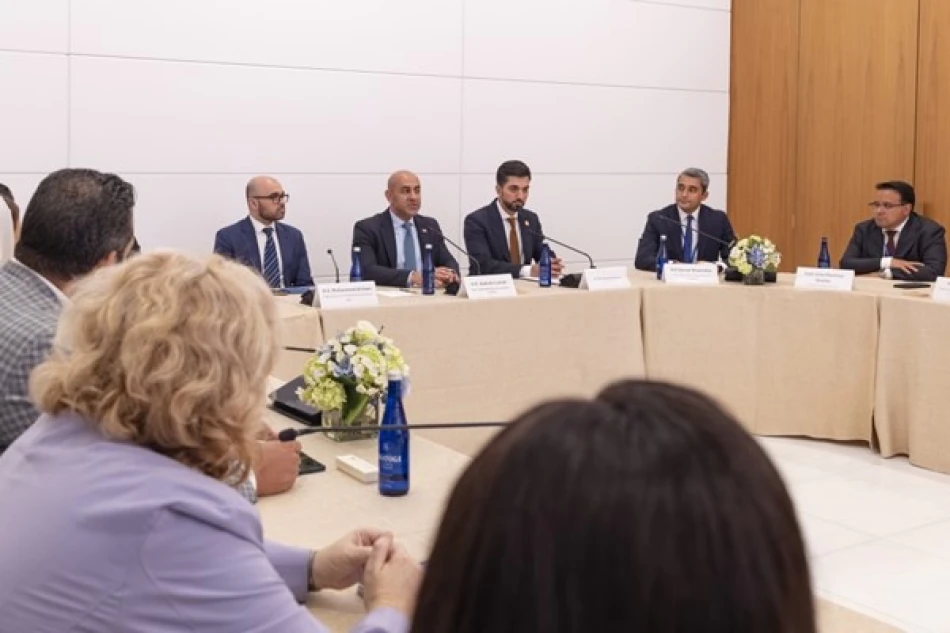
UAE Calls for Inclusive, Balanced Global Economic Growth
UAE Positions Itself as Global Leader in Post-2030 Sustainable Development Vision
The United Arab Emirates is leveraging its economic diversification success to shape the next generation of global development goals, presenting itself as a model for sustainable growth at the UN's High-Level Political Forum on Sustainable Development 2025. With discussions already turning toward post-2045 development targets, the UAE's participation signals its ambition to influence international economic policy beyond the current 2030 agenda.
Strategic Timing as Global Development Framework Evolves
The UAE's prominent role at the UN forum in New York comes at a critical juncture. As the 2030 Sustainable Development Goals approach their halfway mark, international bodies are beginning preliminary discussions about what comes next. The forum's theme—"Strengthening sustainable, inclusive, science and evidence-based solutions for the 2030 Sustainable Development Agenda"—reflects growing recognition that current approaches may need fundamental restructuring.
Abdullah Nasser Lootah, Assistant Minister for Cabinet Affairs for Competitiveness and Knowledge Exchange, emphasized that the UAE has already begun positioning itself for post-2045 development goals, known as "XDGs." This forward-thinking approach mirrors how Singapore and Switzerland have historically influenced international frameworks by demonstrating successful models before formal negotiations begin.
Economic Diplomacy as Soft Power Tool
The UAE organized three key sessions during the forum, showcasing what officials call "economic diplomacy" as a pathway to global stability. This approach represents a significant evolution from traditional development aid models, focusing instead on creating sustainable investment flows and knowledge transfer mechanisms.
Private Sector Investment Strategy
One roundtable session, titled "Beyond 2030: Reimagining Economic Growth for People and Planet," brought together UAE officials with the UAE-US Business Council. The discussion centered on mobilizing private sector investments for inclusive growth—a strategy that has proven successful in the UAE's own transformation from oil dependency to economic diversification.
This model contrasts sharply with traditional donor-recipient relationships that have dominated international development for decades. Instead, the UAE is promoting what could be termed "partnership capitalism," where developing nations become integrated into global value chains rather than remaining aid recipients.
Lessons from UAE's Economic Transformation
The UAE's credibility in these discussions stems from its own remarkable economic evolution. Over the past two decades, the country has successfully diversified away from oil dependence, with non-oil sectors now contributing over 70% of GDP. This transformation involved strategic investments in logistics, financial services, tourism, and renewable energy—sectors that are now central to global sustainability discussions.
Skills Gap Solutions
UAE officials highlighted their focus on addressing global skills gaps through what they term "future of work" initiatives. This approach recognizes that technological advancement and climate transition will require massive workforce retraining—a challenge that traditional education systems are ill-equipped to handle.
The UAE's strategy involves creating public-private partnerships for skills development, a model that could prove particularly relevant for emerging economies struggling with youth unemployment and technological disruption.
Global Implications for Development Finance
The UAE's approach signals a broader shift in how middle powers are engaging with global development challenges. Rather than waiting for major powers to set agendas, countries like the UAE are proactively shaping discussions through demonstrated success and strategic partnerships.
This trend reflects growing recognition that the traditional Western-led development model may be insufficient for addressing 21st-century challenges. The UAE's emphasis on "comprehensive vital ecosystems for international trade" suggests a focus on systemic change rather than project-based interventions.
Competition for Development Leadership
The UAE's positioning comes amid intensifying competition for influence in global development circles. China's Belt and Road Initiative, India's South-South cooperation programs, and Saudi Arabia's Vision 2030 all represent alternative models to traditional Western development approaches.
By focusing on economic diplomacy and private sector engagement, the UAE is carving out a distinct niche that could prove attractive to developing nations seeking growth-oriented partnerships rather than aid dependency.
Market and Investor Perspective
For international investors, the UAE's approach offers several compelling elements. The country's success in creating business-friendly environments, combined with its strategic location between Europe, Asia, and Africa, makes it an attractive partner for companies seeking to expand into emerging markets.
The emphasis on sustainable growth also aligns with increasing ESG (Environmental, Social, and Governance) requirements from international investors and development finance institutions. This convergence of commercial and developmental interests could unlock significant capital flows for sustainable development projects.
As discussions about post-2030 development goals intensify, the UAE's proactive engagement positions it as a key player in shaping the next generation of global development frameworks. Whether this translates into concrete influence will depend largely on the country's ability to demonstrate scalable solutions and build broader coalitions around its vision of partnership-based development.
Most Viewed News

 Layla Al Mansoori
Layla Al Mansoori






